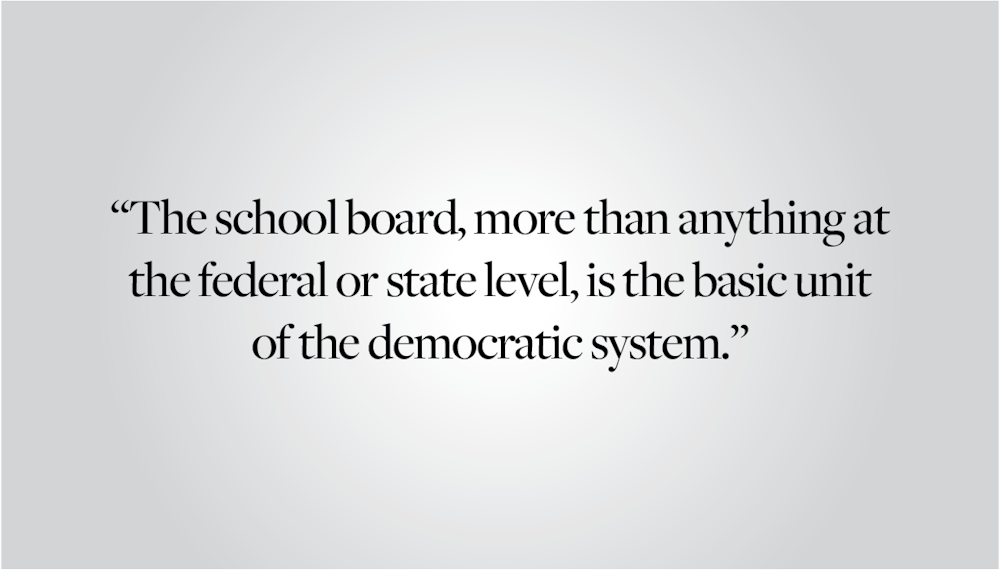Few topics that compel discourse quite like public education. Whether about book bans or science curricula, conversations surrounding K-12 classrooms lay bare our greatest hopes and deepest inadequacies as a democratic society. We tend to think about the great inequalities of the American public education system in terms of economic resources — for instance, which schools have access to arts programs, newly-renovated buildings and full-time faculty. A great deal of research has been dedicated to tracing the outcomes of public schools in neighborhoods of different socioeconomic statuses and the effects of federal grants on education — deservedly so. But money is only one part of the picture. The great disparities in school governance — how parents, students and community members are able to participate in decision-making processes at their local schools — are often ignored. This is particularly true in Providence, where many families and community members currently face dire threats to their ability to self-govern due to a state takeover. To fully understand and combat inequality in public education, we must attend to the inequalities in how schools are governed and whose voices are prioritized — here in Providence and nationwide.
It is a fact long recognized that the education system in the United States is shaped by community wealth. Since property taxes remain the primary mechanism for funding public schools, there are severe disparities between schools in high- and low-income neighborhoods, despite state and federal endeavors to close these gaps. These discrepancies also map onto racial lines — an EdBuild study in 2019 found that, nationally, predominantly white districts receive $23 billion more in funding than nonwhite districts. But, perhaps unexpectedly, the effects of unequal funding can ripple beyond classroom materials and renovations and onto the exercise of local democratic power. To understand why, we need look no further than Providence’s own public schools.
Currently, the Providence Public School District is under the control of the Rhode Island Department of Education. This is the result of a school takeover initiated by the state in 2019 following the publication of the infamous Johns Hopkins University review. The report documented “deep, systemic dysfunctions” in the district. As part of the takeover, RIDE transferred most of the school board’s power to a state-appointed commissioner. For decades, takeovers have been deployed across the country — usually in low-funded, low-performing districts — to boost student performance and outcomes. But the practice has recently faced intense public scrutiny. There is good reason for the controversy. There is little to suggest that takeovers actually improve academic achievement in public schools: A joint study by Brown and the University of Virginia concluded there is “no evidence that takeover generates academic benefits.”
Even more concerningly, research increasingly shows that takeovers, such as the one unfolding in PPSD, are disproportionately deployed in low-income communities and communities of color — even when controlling for academic performance. This is particularly alarming because school boards have historically served as a key site of political power for Black and Latine residents. These bodies play a crucial role in school governance: They manage the budget, appoint superintendents and review performance. As former superintendent of Metro Nashville Public Schools Shawn Joseph noted, “You can’t have equity in school districts without the support of the school board.” School boards can also serve as “launching pads” propelling community members into future careers in city- or state-level politics. The school board, more than anything at the federal or state level, is the basic unit of the democratic system. And threats to their integrity should be understood as threats to all forms of democratic participation — as well as an unduly imposed limit on the political power of low-income communities and communities of color.
It is true that takeovers often bring an influx of funding to struggling schools and can raise expenditures per student. But these benefits are compromised when they are controlled by the state rather than the families most directly affected by education policies. When there is interference in the traditional channels of community governance and deliberation — particularly when this interference is applied unevenly — it becomes a question of equality.
However, community voices in Providence have not disappeared just because of the state takeover’s reduction of the school board’s power. In fact, grassroots advocacy by student-led groups such as Young Voices and Alliance of Rhode Island Southeast Asians for Education and parent organizations such as Parents Leading for Educational Equity has proved influential in the fight for educational equity in Providence. These organizations work to uplift the voices of community members who feel disempowered by the current system — especially in the wake of the state takeover. Their goal, as described by Young Voices, is for students and community members to “have a seat at the table in all decisions that affect their lives.” Administrators at RIDE and state politicians would do well to heed their demands.
As a self-described “vital anchor institution in the city,” Brown must also live up to its commitment to Providence schools. The University’s support of PPSD often comes in the form of financial investment — whether through voluntary payments to the city or the Fund for the Education of the Children of Providence. However, in addition to these monetary contributions, the University has the power to shape ongoing research into the effects of various school governance models through the Annenberg Institute, which is dedicated to “understanding the causes and mitigating the consequences of educational inequality.” It is here that the University must study and platform efforts by local activists to re-center communities in the governance of their schools.
Alissa Simon ’25 can be reached at alissa_simon@brown.edu. Please send responses to this opinion to letters@browndailyherald.com and other op-eds to opinions@browndailyherald.com.
This column is part of a series of opinion pieces about the impact of wealth and inequality on politics that receives financial support from the Stone Initiative on Inequality. The Herald maintains editorial independence over the published work.





